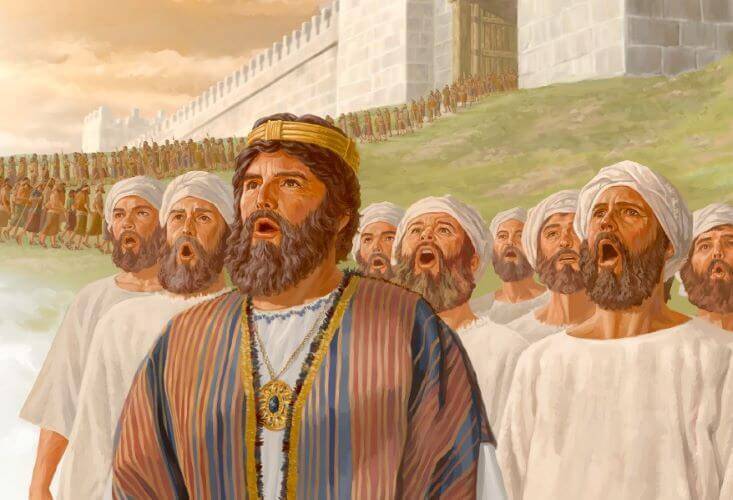
Much space has been dedicated to the theme of worship in holy books and faith communities that its workings and relevance would seem obvious. However, as someone who grew up in church, worship was never clearly explained to me, and it wasn’t something I could clearly infer from my experience. Worship was always assumed to be important. Indeed, half of every church service consisted of it! But worship to me often felt like a lifeless religious exercise. I was never a good hypocrite, and so for years I did my best roman-statue impersonation during worship while waiting for the time to pass.
Human beings respond to melodies, so songs help us have a conversation with God. However, if our worship of Abba only consists of singing songs, we are not worshipping Him at all.
Matthew Stevenson
When we hear the word worship, we often think of music that glorifies God. Indeed, the musical portion of church services is commonly called “praise and worship.” However, music is only one expression of worship. It is possible to sing songs that glorify God and no worship to take place. And it is possible for worship to take place with no music or overt religious expression. That is because worship is ultimately a posture of the heart and a lifestyle. If our lives don’t honor God, then our spiritual disciplines are meaningless–even loathsome–to God.
If one turns away his ear from hearing the law, even his prayer is an abomination.
Proverbs 28:9
What Is Worship?
The most famous definition of worship comes from William Temple, the Archbishop of Canterbury:
Worship is the submission of all of our nature to God. It is the quickening of the conscience by his holiness; the nourishment of mind with his truth; the purifying of imagination by his beauty; the opening of the heart to his love; the surrender of will to his purpose–all this gathered up in adoration, the most selfless emotion of which our nature is capable.
In many sermons, it was common for me to hear of particular believers being described as “worshippers.” King David, for example, was commonly lionized as a worshiper. However, as Matthew Stevenson, Pastor of All Nations Worship Assembly in Chicago, pointed out in Abba: Experience God as Father, and Redeem Your Failure, Hurt, and Pain, “worshipper is the identity of every believer in Jesus Christ, whether or not he can sing.”
And without faith it is impossible to please him, for whoever would draw near to God must believe that he exists and that he rewards those who seek him.
Hebrews 11:6
As human beings, we are designed to pursue reward and avoid punishment. What distinguishes people isn’t this basic MO, but the quality of the rewards they seek and the means they utilitize to achieve them. Scripture makes it abundantly clear that God does not ask anything of anyone with no promise of a reward, even if they do not receive it immediately. And sometimes the reward for obedience is more of God himself, which is a tremendous positive. In sum, the first and greatest commandment is to love God, and so worship must be undertaken in that spirit, not as a mere legalistic transaction. But the believer also worships God, both as a general lifestyle and in specific moments of time, knowing that his will is to reward them for their efforts.
What follows are three of the most powerful benefits of worship that I have been able to identify from my experience and observation. They apply both to worship as a lifestyle AND worship in specific moments of time, via music, meditation, or prose. Many times when I needed an answer from God–for physical healing, mental health, guidance, or difficult circumstances–worship was the vehicle through which I received it (at home or in a corporate setting, it did not matter). Based on the Bible and testimonies of believers I know, this pattern of breakthrough is a rule, not an exception.
Whenever we do not feel like worshiping, due to the hardships and frustrations of life, we can be confident that God will see our efforts and reward our devotion.
Without further ado, the three benefits of worship are as follows:
Benefit #1: Self-Forgetfulness and Mental Health
In The Joy Of Self-Forgetfulness, I quote John Piper, The really wonderful moments of joy in this world are not the moments of self-satisfaction, but self-forgetfulness. Indeed, most of our happiest moments are not spent thinking of ourselves but rather mindfully absorbed in the presence of family, friends, nature, or some meaningful activity. On the flip side, physical pain, emotional pain, trauma, anxiety, insecurity and fear neurotically fixate our attention on ourselves. Moments of self-forgetfulness, it follows, are a huge antidote to misery.
As we spend time with Abba, He will cut away places of fear and anxiety, which become idols that demand our worship. Abba challenges us to open our hearts and minds to Him, removing these hindrances so He can minister healing to our past brokenness.
Matthew Stevenson
Worship is a powerful discipline to cultivate self-forgetfulness. It is a focusing of the attention, via a lifestyle habit or change, or spiritual melody or meditation, on the being and character of God. Given God’s power, beauty, intelligence, and creativity, the potential to be mindfully immersed in worship of God is great. And given God’s goodness, the potential to receive physical and emotional healing is similarly so, independent of explicit answers to prayer.
Benefit #2: God’s Presence and Character
In The 7 Love Languages of God, I identify worship as something that pleases God and elicits from him a response. To be sure, worship is not a one way line of communication. God is quoted in the Bible as saying, “Draw near to me and I will draw near to you” (James 4:8), and one of the ways we draw near to God is through worship. The Psalms say that God’s presence and worship go hand-in-hand. This message is reiterated by John, who had a vision of God’s throne room, which consisted of 24/7 worship. If we want more of God, it follows that we ought to create an atmosphere of worship in our hearts.
Yet you are holy, enthroned on the praises of Israel.
Psalm 22:3
And the four living creatures, each of them with six wings, are full of eyes all around and within, and day and night they never cease to say, “Holy, holy, holy, is the Lord God Almighty, who was and is and is to come!”
Revelation 4:8
There is a famous saying, “You become like what you worship.” In our worship of God, this statement is doubly true, as worship of God leads to personal encounters. There is another famous saying, “You are the average of the five people you spend the most time with.” The idea here is that we become like people we hang around, which has a lot of truth to it. Worship of God combines the power of meditative exaltation and personal presence in its transformation of the worshipper.
When we give ourselves to being consumed with worship, encountering Abba in the leading of the Holy Spirit, we truly receive the life-giving prayer that Jesus prayed for us. We become one with the Father, as the Father always desired to be one with us.
Matthew Stevenson
Benefit #3: God’s Power and Answered Prayers
Prayer is a breeding ground for testimonies and miracles. And so is worship. Once we have prayed about a situation and don’t know what else to do, worship may be a good resort as we wait on the Lord. There are two passages in the Bible, one in the Old Testament and the other in the New Testament, that vividly illustrate the power of worship to evoke God’s presence and miracle-working power.
The first example is told in the book of 2nd Chronicles. Moab and Ammon, two common enemies of ancient Israel, had amassed allies and were marching to attack. When Word got to King Jehoshaphat, he was alarmed and sought God’s help. Pay special attention to verses 22-23.
Then Jehoshaphat bowed his head with his face to the ground, and all Judah and the inhabitants of Jerusalem fell down before the Lord, worshiping the Lord. 19 And the Levites, of the Kohathites and the Korahites, stood up to praise the Lord, the God of Israel, with a very loud voice.
20 And they rose early in the morning and went out into the wilderness of Tekoa. And when they went out, Jehoshaphat stood and said, “Hear me, Judah and inhabitants of Jerusalem! Believe in the Lord your God, and you will be established; believe his prophets, and you will succeed.” 21 And when he had taken counsel with the people, he appointed those who were to sing to the Lord and praise him in holy attire, as they went before the army, and say,
“Give thanks to the Lord,
for his steadfast love endures forever.”22 And when they began to sing and praise, the Lord set an ambush against the men of Ammon, Moab, and Mount Seir, who had come against Judah, so that they were routed. 23 For the men of Ammon and Moab rose against the inhabitants of Mount Seir, devoting them to destruction, and when they had made an end of the inhabitants of Seir, they all helped to destroy one another.
2 Chronicles 20:18-23
The second example comes from Acts. Paul and Silas had been imprisoned in Macedonia for expelling a spirit of divination from a woman, which damaged the local economic prospects of her owners.
About midnight Paul and Silas were praying and singing hymns to God, and the prisoners were listening to them, 26 and suddenly there was a great earthquake, so that the foundations of the prison were shaken. And immediately all the doors were opened, and everyone’s bonds were unfastened.
Acts 16:25
There is an old church saying, “Praises go up, blessings come down.” It really is that simple. And sometimes God will give us something we need, even if we aren’t able to identify it in prayer.


